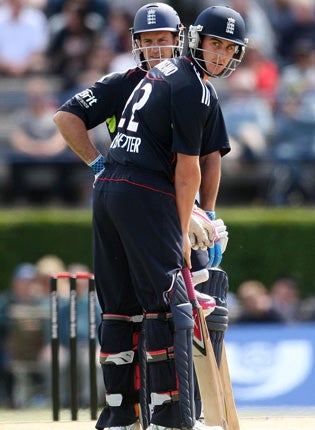Flower's England set to take the Aussie test

Your support helps us to tell the story
From reproductive rights to climate change to Big Tech, The Independent is on the ground when the story is developing. Whether it's investigating the financials of Elon Musk's pro-Trump PAC or producing our latest documentary, 'The A Word', which shines a light on the American women fighting for reproductive rights, we know how important it is to parse out the facts from the messaging.
At such a critical moment in US history, we need reporters on the ground. Your donation allows us to keep sending journalists to speak to both sides of the story.
The Independent is trusted by Americans across the entire political spectrum. And unlike many other quality news outlets, we choose not to lock Americans out of our reporting and analysis with paywalls. We believe quality journalism should be available to everyone, paid for by those who can afford it.
Your support makes all the difference.There is something charmingly different about England's one-day cricket now. The charm is all in the ruthlessness. As if from nowhere, they have arrived as a side playing in a style that is attacking, confident, authoritative. Why, they can dare to contemplate competing effectively with Australia in the five match series which begins at the Rose Bowl tomorrow.
Since Australia have become utterly pre-eminent in the 50-over game – losing only seven of their last 40 matches (three of those in dead rubbers), only two of the most recent 19, and were runaway winners last autumn of the Champions Trophy – that is some progress.
It has come from somewhere, of course. It has come originally from the minds of the coach, Andy Flower, and the captain, Andrew Strauss. Gradually, they hatched their strategy over several months last year. The need to put it into action became urgent when England were cruelly exposed by Australia in the one-day series after the Ashes last season, winning only the seventh and final match. By the time the Champions Trophy began in South Africa, the prototype was ready to fly. And fly it did – until it was brought back to earth by, who else, Australia in the semi-final. But Flower and Strauss knew there was no turning back. They had to get the craft airborne again and if they have been prepared to change some of the parts, they have adhered rigorously to their blueprint.
It is based on trenchant, athletic cricket. While, in batting terms, it means coming out slugging from the start, that is merely a symbol of what they are about. The bowling is meant to be similarly robust and, as in the World Twenty20 and in preparation for the World Cup in the sub-continent next year, will be based from hereon in on two spinners tying up the middle overs.
Perhaps above all, the fielding has a presence and control about it which has not been readily associated with England in the past. The players are quick and athletic. It is why, for instance, there can be no recall for a player like Owais Shah, who made a glittering 92 for Middlesex against Australia on Saturday but who remains leaden-footed in the field. For Shah, and men like him, there is now no room in Flower's England.
The swift and simple victory against Scotland on Saturday betokened this new England. They restricted opponents who, admittedly, are in steep decline and then brushed them aside with the bat. This spring, their step has been lifted by the unexpected but overwhelming victory in the World Twenty20 last month.
There is a world of difference between 20-over and 50-over cricket but England bring more or less the same tricks to both forms. They cannot be quite so gung-ho in the longer limited-overs form but the style is still geared to attack to give them control. If this goes wrong against Australia in the next fortnight – and it could – then Flower (and Strauss) will not look so smart as he does now. That is the lot of the coach (ask one F Capello) and critics must, of course, reserve the right to tell him retrospectively where he went wrong while at present welcoming his innovation.
But Flower has taken the players with him at every stage. They believe in what he is attempting to do and he has been prepared to pick the players to fit the plan. Hence, the swift elevation of Craig Kieswetter, the long, straight hitter from South Africa who made the top score of 69 on Saturday and shared an opening partnership of 121 with Strauss. One man who epitomises this new approach is Paul Collingwood, who took them to Twenty20 glory in the Caribbean. He made it clear after England's victory against Scotland in Edinburgh on Saturday that the new approach would not change against Australia,
"You've got to go hard at them," he said. "We've learnt that over the last five or six years. If it comes off it puts them under a lot of pressure."
England are probably not ready to beat Australia yet but that they expect to give them a contest makes this series unexpectedly attractive, if still excessive. Australia will need to bat relentlessly because their bowling looks modest at best, experimental at worst. But they remain, as always, Australia.
Join our commenting forum
Join thought-provoking conversations, follow other Independent readers and see their replies
Comments